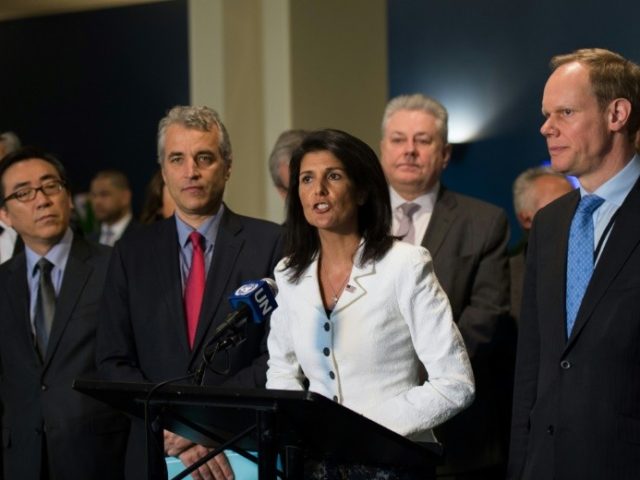American Ambassador to the United Nations Nikki Haley announced Monday that her country and a list of nearly forty others would not participate in a meeting to pass an international nuclear weapons ban, calling the proposal “naive” and warning that “bad actors” like North Korea would take advantage of it.
Haley’s opposition to a global nuclear weapons ban – which she argues only responsible nations would follow, leaving them vulnerable to attack from rogue states – follows multiple calls from the Trump administration to modernize the American nuclear weapons arsenal.
“You are going to see almost 40 countries that are not in the General Assembly today,” Haley told reporters on Monday. “To ban nuclear weapons now would make us and our allies more vulnerable, and would strengthen bad actors like North Korea and Iran who would not abide by it.”
“There is nothing I want more for my family than a world with no nuclear weapons. But we have to be realistic,” Haley continued. “Is there anyone that believes that North Korea would agree to a ban on nuclear weapons?”
“In this day and time we can’t honestly that say we can protect our people by allowing the bad actors to have them [nuclear weapons] and those of us that are good, trying to keep peace and safety, not to have them,” Haley argued. She argued that those supporting the nuclear weapons ban did not understand the potential negative effect disarming responsible international actors would have and argued that North Korea and Iran would both be “cheering” if such a nuclear weapons ban passed.
The international resolution Haley opposes is the product of the UN General Assembly, which passed the legislation in December calling for the member nations to “negotiate a legally binding instrument to prohibit nuclear weapons, leading towards their total elimination,” according to Reuters. Haley argues that such legislation would disarm responsible nations and remove a necessary deterrent for rogue nations who have since acquired some nuclear capabilities.
Instead, Haley argued, the UN should adhere to the Nuclear Non-Proliferation Treaty signed in 1968. That treaty conceded that five nations would retain their nuclear weapons – the five member nations of the UN Security Council – while aspiring to contain the spread of nuclear weapons. The treaty does not address nations that have since acquired nuclear weapons, however, like India and Pakistan, and rogue nations like Iran and North Korea. North Korea, The Independent notes, was a signatory to the non-proliferation treaty until 2003 and has since conducted five nuclear tests.
The forty countries opposing the proposed nuclear weapons ban – including the UK and France, among others – stand in opposition to over one hundred countries that have expressed support for the ban. International influencers like Pope Francis have also stated their support for the ban.
Haley’s defense of the American nuclear weapons arsenal is the latest expression of the Trump administration’s support for maintaining a modern, efficient nuclear capability. “The United States must greatly strengthen and expand its nuclear capability until such time as the world comes to its senses regarding nukes,” President Donald Trump wrote on Twitter in December, before taking office. At the time, Press Secretary-to-be Sean Spicer told reporters his statement meant “the president is going to put our nation’s security and safety first… that’s what every American should understand that he’s not going to be a passive president.”
Trump reiterated his policy to modernize America’s nuclear capabilities in February in a conversation with Russian President Vladimir Putin, after Putin had told reporters in December he did not find anything “unusual” about Trump’s expansion of nuclear policies. Trump reportedly expressed his dissatisfaction with the New START treaty, which caps the number of nuclear warheads both Russia and the United States can maintain and calls for the destruction of much of the current nuclear arsenal. Trump later told Reuters that he believed the United States had “fallen behind on nuclear weapon capacity.” “It would be wonderful, a dream would be that no country would have nukes, but if countries are going to have nukes, we’re going to be at the top of the pack,” Trump promised.
Trump’s policy towards nuclear weapons has alarmed America’s communist enemies on the other side of the world. “China won’t pay into Trump’s protection racket. It should use the money to build more strategic nuclear arms and accelerate the deployment of the DF-41 intercontinental ballistic missile,” the alarmist state propaganda newspaper The Global Times wrote in December, following Trump’s tweet calling for improved nuclear weapons. North Korea’s state media has beeneven more belligerent.
This week, the Rodong Sinmun declared North Korea a “non-nuclear state” while threatening a preemptive nuclear strike on America once again. On the UN dispute, Rodong wrote: “The U.S. administration had better lend an ear to the serious advice of the international community that its insistence on the senseless hostile policy toward the DPRK would make it suffer bitter setbacks as its predecessor did.”
Nonetheless, the North Korean state newspaper threatened in a column today that, should America show “even the slightest sign of a preemptive attack on the DPRK, bereft of reason, the powerful nuclear strike means of the DPRK will blow up the bases of aggression and provocation with its-style offensive and preemptive nuclear attack.”

COMMENTS
Please let us know if you're having issues with commenting.